Sociological and Biological Models of Health and Illness: A Comparison
VerifiedAdded on 2021/03/16
|11
|2175
|497
Essay
AI Summary
This essay critically examines the contrasting sociological and biological definitions of health and illness, highlighting their respective strengths and weaknesses. It begins by defining both models, with the sociological model emphasizing social, economic, and environmental determinants, and the biological model focusing on the physical and medical aspects of disease. The essay then evaluates the impact of social factors like social class, ethnicity, and gender on health chances, incorporating sociological theories such as Functionalism, Marxism, and Feminism to provide different perspectives on how society and human behavior influence health. It discusses the role of health professionals and the limitations they face, concluding with a call for social policies to address inequalities and improve public health. The essay also references the Black Report and other relevant studies.
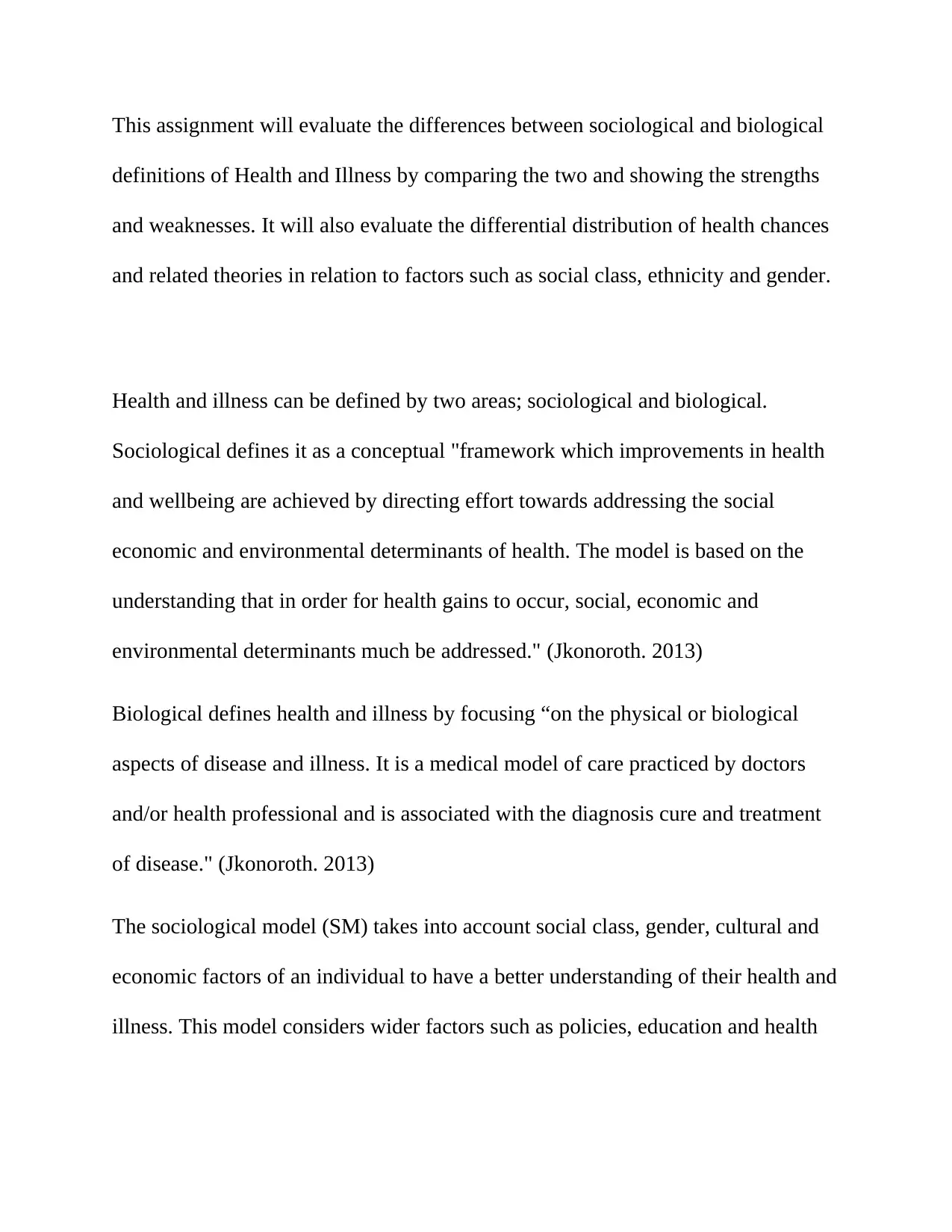
This assignment will evaluate the differences between sociological and biological
definitions of Health and Illness by comparing the two and showing the strengths
and weaknesses. It will also evaluate the differential distribution of health chances
and related theories in relation to factors such as social class, ethnicity and gender.
Health and illness can be defined by two areas; sociological and biological.
Sociological defines it as a conceptual "framework which improvements in health
and wellbeing are achieved by directing effort towards addressing the social
economic and environmental determinants of health. The model is based on the
understanding that in order for health gains to occur, social, economic and
environmental determinants much be addressed." (Jkonoroth. 2013)
Biological defines health and illness by focusing “on the physical or biological
aspects of disease and illness. It is a medical model of care practiced by doctors
and/or health professional and is associated with the diagnosis cure and treatment
of disease." (Jkonoroth. 2013)
The sociological model (SM) takes into account social class, gender, cultural and
economic factors of an individual to have a better understanding of their health and
illness. This model considers wider factors such as policies, education and health
definitions of Health and Illness by comparing the two and showing the strengths
and weaknesses. It will also evaluate the differential distribution of health chances
and related theories in relation to factors such as social class, ethnicity and gender.
Health and illness can be defined by two areas; sociological and biological.
Sociological defines it as a conceptual "framework which improvements in health
and wellbeing are achieved by directing effort towards addressing the social
economic and environmental determinants of health. The model is based on the
understanding that in order for health gains to occur, social, economic and
environmental determinants much be addressed." (Jkonoroth. 2013)
Biological defines health and illness by focusing “on the physical or biological
aspects of disease and illness. It is a medical model of care practiced by doctors
and/or health professional and is associated with the diagnosis cure and treatment
of disease." (Jkonoroth. 2013)
The sociological model (SM) takes into account social class, gender, cultural and
economic factors of an individual to have a better understanding of their health and
illness. This model considers wider factors such as policies, education and health
Paraphrase This Document
Need a fresh take? Get an instant paraphrase of this document with our AI Paraphraser
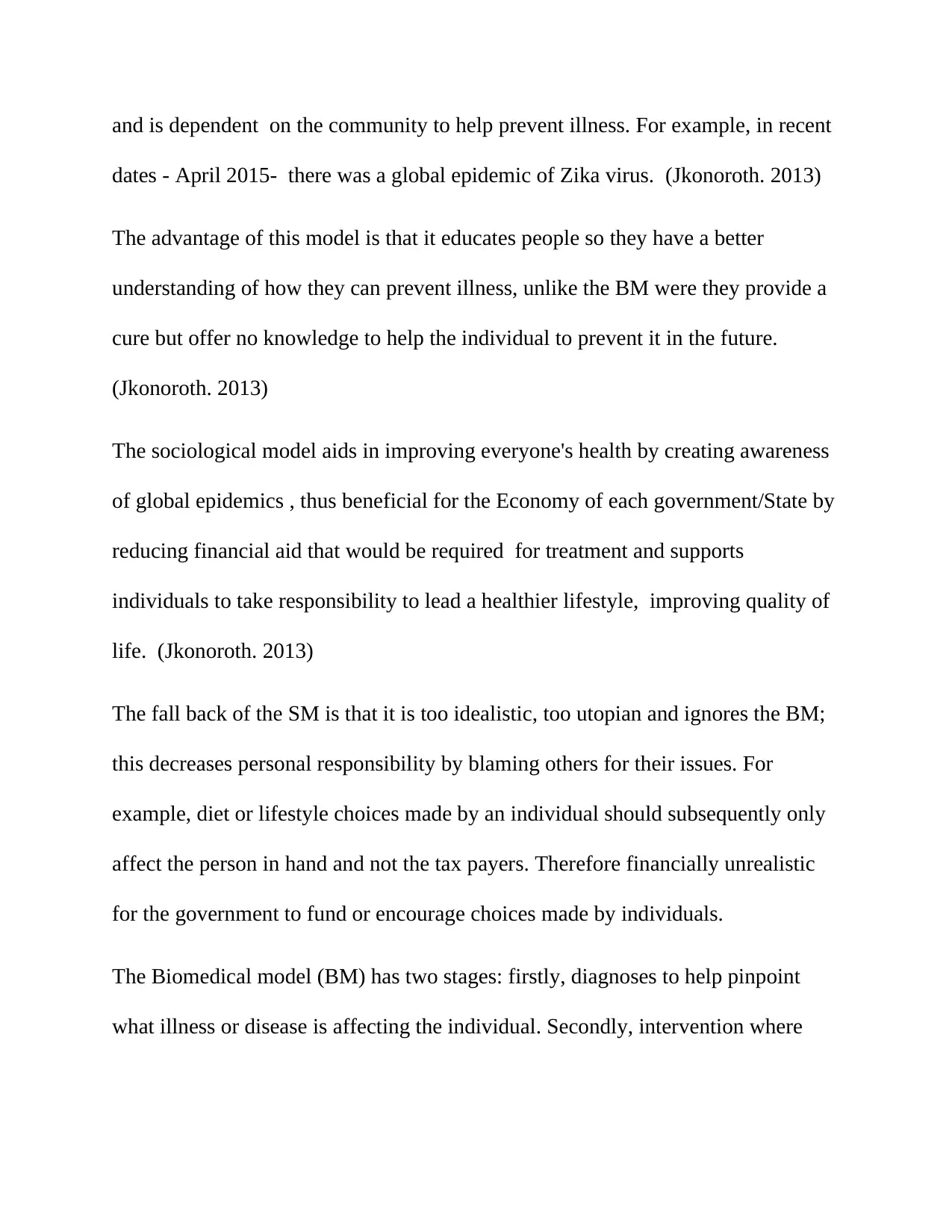
and is dependent on the community to help prevent illness. For example, in recent
dates - April 2015- there was a global epidemic of Zika virus. (Jkonoroth. 2013)
The advantage of this model is that it educates people so they have a better
understanding of how they can prevent illness, unlike the BM were they provide a
cure but offer no knowledge to help the individual to prevent it in the future.
(Jkonoroth. 2013)
The sociological model aids in improving everyone's health by creating awareness
of global epidemics , thus beneficial for the Economy of each government/State by
reducing financial aid that would be required for treatment and supports
individuals to take responsibility to lead a healthier lifestyle, improving quality of
life. (Jkonoroth. 2013)
The fall back of the SM is that it is too idealistic, too utopian and ignores the BM;
this decreases personal responsibility by blaming others for their issues. For
example, diet or lifestyle choices made by an individual should subsequently only
affect the person in hand and not the tax payers. Therefore financially unrealistic
for the government to fund or encourage choices made by individuals.
The Biomedical model (BM) has two stages: firstly, diagnoses to help pinpoint
what illness or disease is affecting the individual. Secondly, intervention where
dates - April 2015- there was a global epidemic of Zika virus. (Jkonoroth. 2013)
The advantage of this model is that it educates people so they have a better
understanding of how they can prevent illness, unlike the BM were they provide a
cure but offer no knowledge to help the individual to prevent it in the future.
(Jkonoroth. 2013)
The sociological model aids in improving everyone's health by creating awareness
of global epidemics , thus beneficial for the Economy of each government/State by
reducing financial aid that would be required for treatment and supports
individuals to take responsibility to lead a healthier lifestyle, improving quality of
life. (Jkonoroth. 2013)
The fall back of the SM is that it is too idealistic, too utopian and ignores the BM;
this decreases personal responsibility by blaming others for their issues. For
example, diet or lifestyle choices made by an individual should subsequently only
affect the person in hand and not the tax payers. Therefore financially unrealistic
for the government to fund or encourage choices made by individuals.
The Biomedical model (BM) has two stages: firstly, diagnoses to help pinpoint
what illness or disease is affecting the individual. Secondly, intervention where
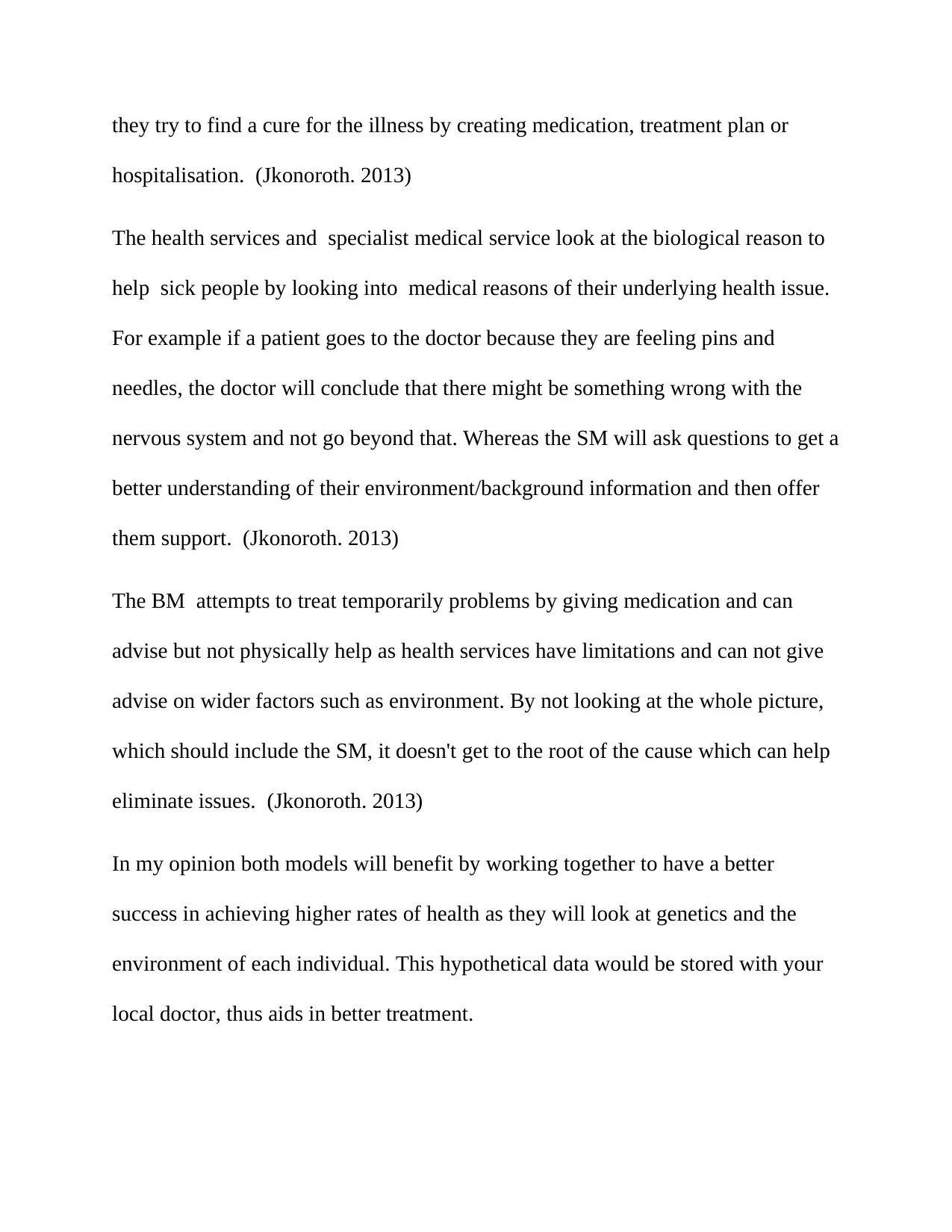
they try to find a cure for the illness by creating medication, treatment plan or
hospitalisation. (Jkonoroth. 2013)
The health services and specialist medical service look at the biological reason to
help sick people by looking into medical reasons of their underlying health issue.
For example if a patient goes to the doctor because they are feeling pins and
needles, the doctor will conclude that there might be something wrong with the
nervous system and not go beyond that. Whereas the SM will ask questions to get a
better understanding of their environment/background information and then offer
them support. (Jkonoroth. 2013)
The BM attempts to treat temporarily problems by giving medication and can
advise but not physically help as health services have limitations and can not give
advise on wider factors such as environment. By not looking at the whole picture,
which should include the SM, it doesn't get to the root of the cause which can help
eliminate issues. (Jkonoroth. 2013)
In my opinion both models will benefit by working together to have a better
success in achieving higher rates of health as they will look at genetics and the
environment of each individual. This hypothetical data would be stored with your
local doctor, thus aids in better treatment.
hospitalisation. (Jkonoroth. 2013)
The health services and specialist medical service look at the biological reason to
help sick people by looking into medical reasons of their underlying health issue.
For example if a patient goes to the doctor because they are feeling pins and
needles, the doctor will conclude that there might be something wrong with the
nervous system and not go beyond that. Whereas the SM will ask questions to get a
better understanding of their environment/background information and then offer
them support. (Jkonoroth. 2013)
The BM attempts to treat temporarily problems by giving medication and can
advise but not physically help as health services have limitations and can not give
advise on wider factors such as environment. By not looking at the whole picture,
which should include the SM, it doesn't get to the root of the cause which can help
eliminate issues. (Jkonoroth. 2013)
In my opinion both models will benefit by working together to have a better
success in achieving higher rates of health as they will look at genetics and the
environment of each individual. This hypothetical data would be stored with your
local doctor, thus aids in better treatment.
⊘ This is a preview!⊘
Do you want full access?
Subscribe today to unlock all pages.

Trusted by 1+ million students worldwide
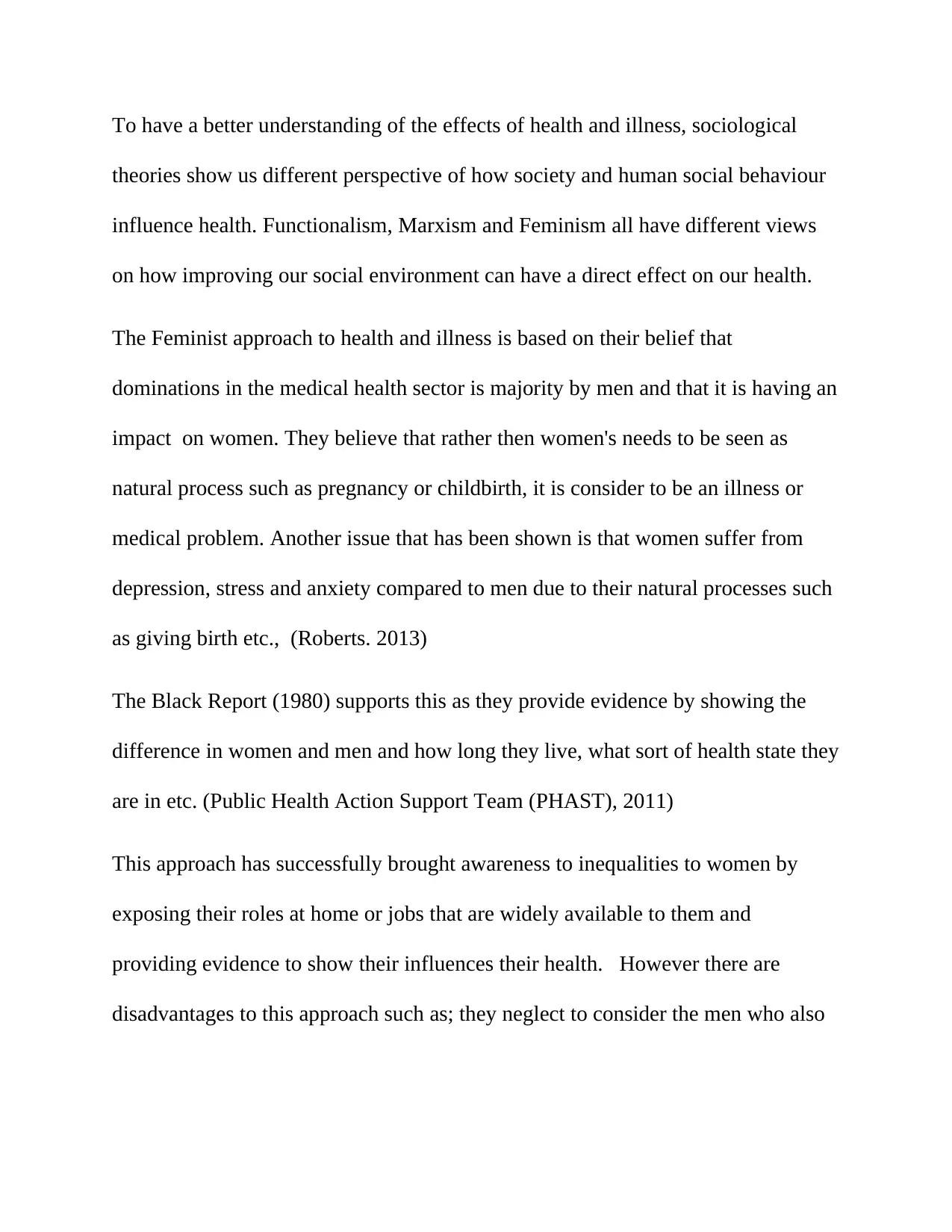
To have a better understanding of the effects of health and illness, sociological
theories show us different perspective of how society and human social behaviour
influence health. Functionalism, Marxism and Feminism all have different views
on how improving our social environment can have a direct effect on our health.
The Feminist approach to health and illness is based on their belief that
dominations in the medical health sector is majority by men and that it is having an
impact on women. They believe that rather then women's needs to be seen as
natural process such as pregnancy or childbirth, it is consider to be an illness or
medical problem. Another issue that has been shown is that women suffer from
depression, stress and anxiety compared to men due to their natural processes such
as giving birth etc., (Roberts. 2013)
The Black Report (1980) supports this as they provide evidence by showing the
difference in women and men and how long they live, what sort of health state they
are in etc. (Public Health Action Support Team (PHAST), 2011)
This approach has successfully brought awareness to inequalities to women by
exposing their roles at home or jobs that are widely available to them and
providing evidence to show their influences their health. However there are
disadvantages to this approach such as; they neglect to consider the men who also
theories show us different perspective of how society and human social behaviour
influence health. Functionalism, Marxism and Feminism all have different views
on how improving our social environment can have a direct effect on our health.
The Feminist approach to health and illness is based on their belief that
dominations in the medical health sector is majority by men and that it is having an
impact on women. They believe that rather then women's needs to be seen as
natural process such as pregnancy or childbirth, it is consider to be an illness or
medical problem. Another issue that has been shown is that women suffer from
depression, stress and anxiety compared to men due to their natural processes such
as giving birth etc., (Roberts. 2013)
The Black Report (1980) supports this as they provide evidence by showing the
difference in women and men and how long they live, what sort of health state they
are in etc. (Public Health Action Support Team (PHAST), 2011)
This approach has successfully brought awareness to inequalities to women by
exposing their roles at home or jobs that are widely available to them and
providing evidence to show their influences their health. However there are
disadvantages to this approach such as; they neglect to consider the men who also
Paraphrase This Document
Need a fresh take? Get an instant paraphrase of this document with our AI Paraphraser
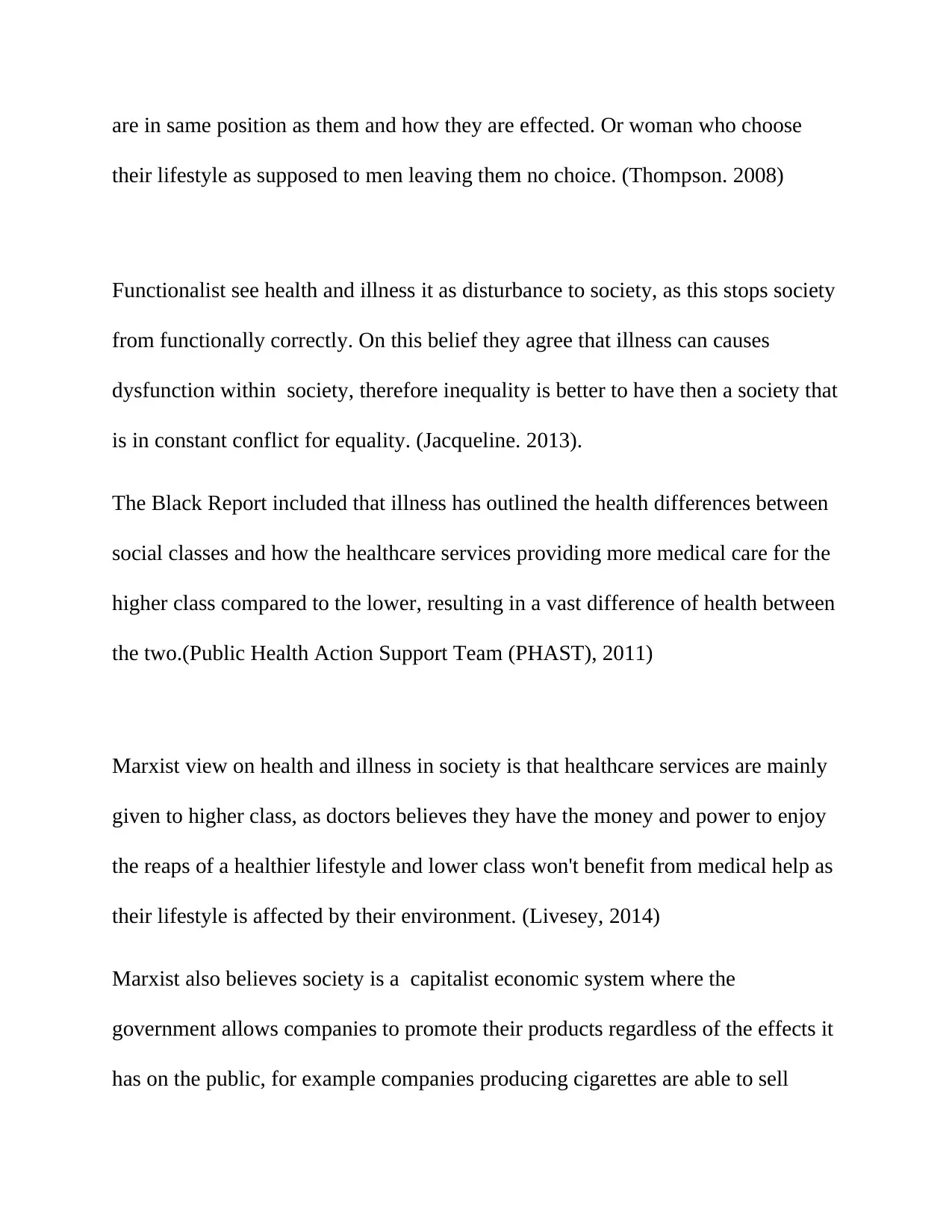
are in same position as them and how they are effected. Or woman who choose
their lifestyle as supposed to men leaving them no choice. (Thompson. 2008)
Functionalist see health and illness it as disturbance to society, as this stops society
from functionally correctly. On this belief they agree that illness can causes
dysfunction within society, therefore inequality is better to have then a society that
is in constant conflict for equality. (Jacqueline. 2013).
The Black Report included that illness has outlined the health differences between
social classes and how the healthcare services providing more medical care for the
higher class compared to the lower, resulting in a vast difference of health between
the two.(Public Health Action Support Team (PHAST), 2011)
Marxist view on health and illness in society is that healthcare services are mainly
given to higher class, as doctors believes they have the money and power to enjoy
the reaps of a healthier lifestyle and lower class won't benefit from medical help as
their lifestyle is affected by their environment. (Livesey, 2014)
Marxist also believes society is a capitalist economic system where the
government allows companies to promote their products regardless of the effects it
has on the public, for example companies producing cigarettes are able to sell
their lifestyle as supposed to men leaving them no choice. (Thompson. 2008)
Functionalist see health and illness it as disturbance to society, as this stops society
from functionally correctly. On this belief they agree that illness can causes
dysfunction within society, therefore inequality is better to have then a society that
is in constant conflict for equality. (Jacqueline. 2013).
The Black Report included that illness has outlined the health differences between
social classes and how the healthcare services providing more medical care for the
higher class compared to the lower, resulting in a vast difference of health between
the two.(Public Health Action Support Team (PHAST), 2011)
Marxist view on health and illness in society is that healthcare services are mainly
given to higher class, as doctors believes they have the money and power to enjoy
the reaps of a healthier lifestyle and lower class won't benefit from medical help as
their lifestyle is affected by their environment. (Livesey, 2014)
Marxist also believes society is a capitalist economic system where the
government allows companies to promote their products regardless of the effects it
has on the public, for example companies producing cigarettes are able to sell
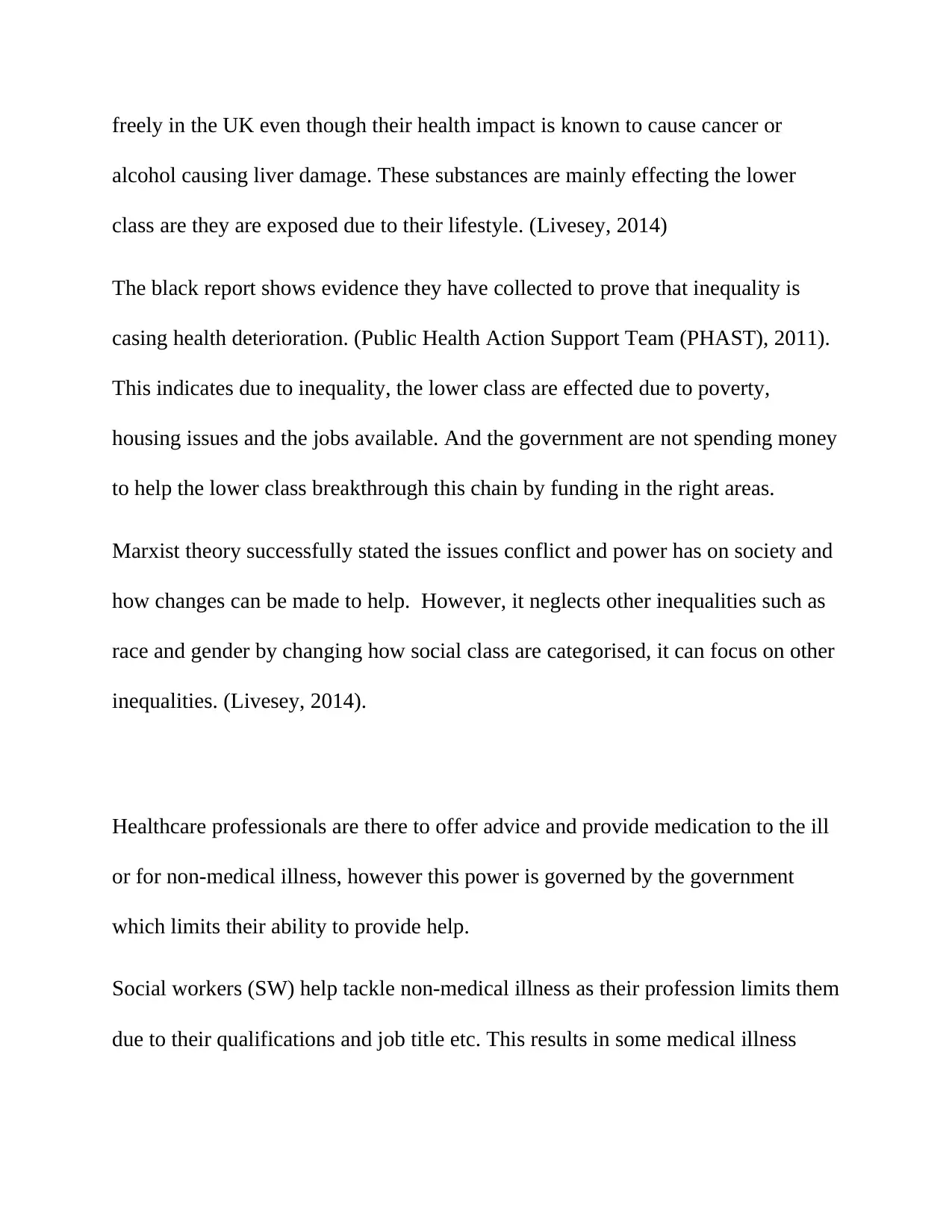
freely in the UK even though their health impact is known to cause cancer or
alcohol causing liver damage. These substances are mainly effecting the lower
class are they are exposed due to their lifestyle. (Livesey, 2014)
The black report shows evidence they have collected to prove that inequality is
casing health deterioration. (Public Health Action Support Team (PHAST), 2011).
This indicates due to inequality, the lower class are effected due to poverty,
housing issues and the jobs available. And the government are not spending money
to help the lower class breakthrough this chain by funding in the right areas.
Marxist theory successfully stated the issues conflict and power has on society and
how changes can be made to help. However, it neglects other inequalities such as
race and gender by changing how social class are categorised, it can focus on other
inequalities. (Livesey, 2014).
Healthcare professionals are there to offer advice and provide medication to the ill
or for non-medical illness, however this power is governed by the government
which limits their ability to provide help.
Social workers (SW) help tackle non-medical illness as their profession limits them
due to their qualifications and job title etc. This results in some medical illness
alcohol causing liver damage. These substances are mainly effecting the lower
class are they are exposed due to their lifestyle. (Livesey, 2014)
The black report shows evidence they have collected to prove that inequality is
casing health deterioration. (Public Health Action Support Team (PHAST), 2011).
This indicates due to inequality, the lower class are effected due to poverty,
housing issues and the jobs available. And the government are not spending money
to help the lower class breakthrough this chain by funding in the right areas.
Marxist theory successfully stated the issues conflict and power has on society and
how changes can be made to help. However, it neglects other inequalities such as
race and gender by changing how social class are categorised, it can focus on other
inequalities. (Livesey, 2014).
Healthcare professionals are there to offer advice and provide medication to the ill
or for non-medical illness, however this power is governed by the government
which limits their ability to provide help.
Social workers (SW) help tackle non-medical illness as their profession limits them
due to their qualifications and job title etc. This results in some medical illness
⊘ This is a preview!⊘
Do you want full access?
Subscribe today to unlock all pages.

Trusted by 1+ million students worldwide
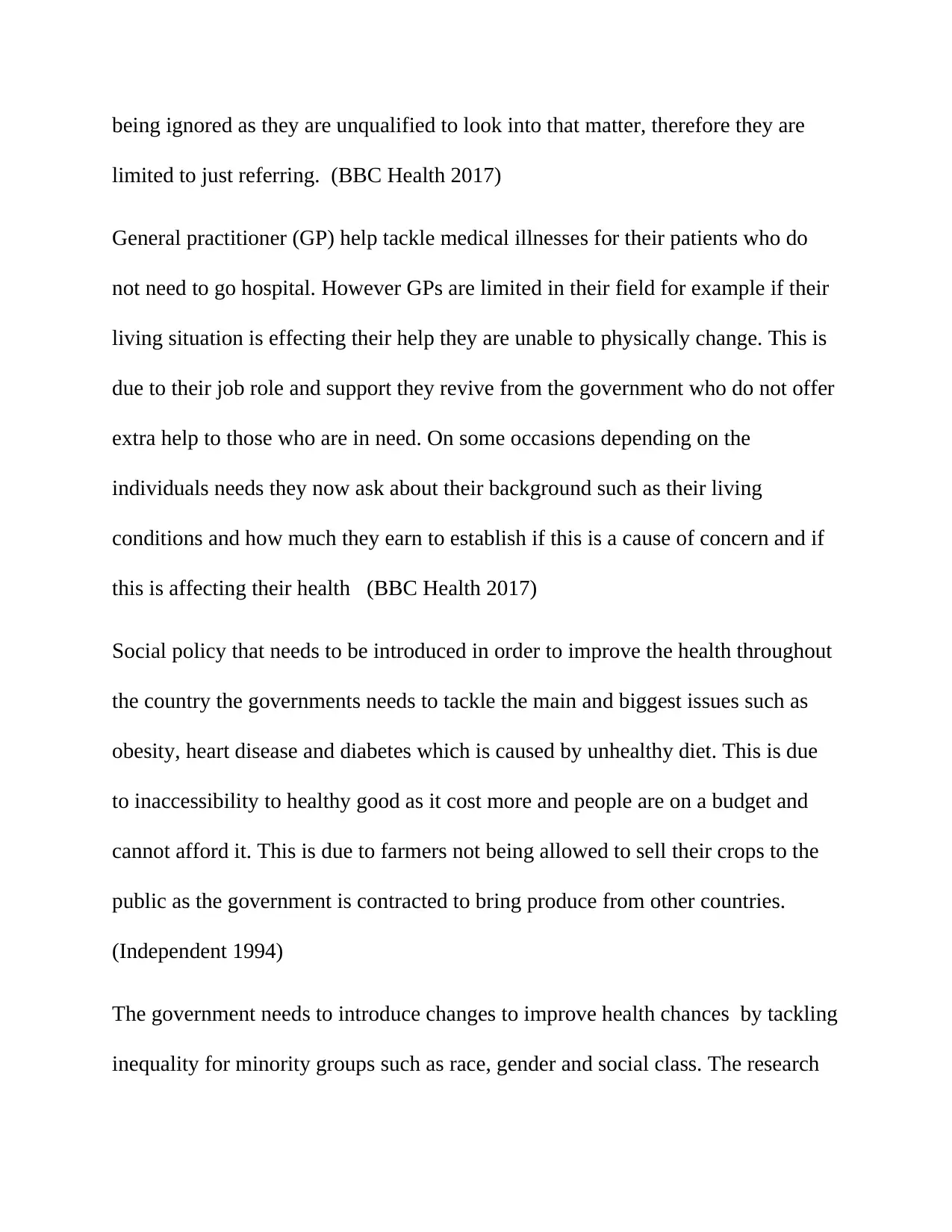
being ignored as they are unqualified to look into that matter, therefore they are
limited to just referring. (BBC Health 2017)
General practitioner (GP) help tackle medical illnesses for their patients who do
not need to go hospital. However GPs are limited in their field for example if their
living situation is effecting their help they are unable to physically change. This is
due to their job role and support they revive from the government who do not offer
extra help to those who are in need. On some occasions depending on the
individuals needs they now ask about their background such as their living
conditions and how much they earn to establish if this is a cause of concern and if
this is affecting their health (BBC Health 2017)
Social policy that needs to be introduced in order to improve the health throughout
the country the governments needs to tackle the main and biggest issues such as
obesity, heart disease and diabetes which is caused by unhealthy diet. This is due
to inaccessibility to healthy good as it cost more and people are on a budget and
cannot afford it. This is due to farmers not being allowed to sell their crops to the
public as the government is contracted to bring produce from other countries.
(Independent 1994)
The government needs to introduce changes to improve health chances by tackling
inequality for minority groups such as race, gender and social class. The research
limited to just referring. (BBC Health 2017)
General practitioner (GP) help tackle medical illnesses for their patients who do
not need to go hospital. However GPs are limited in their field for example if their
living situation is effecting their help they are unable to physically change. This is
due to their job role and support they revive from the government who do not offer
extra help to those who are in need. On some occasions depending on the
individuals needs they now ask about their background such as their living
conditions and how much they earn to establish if this is a cause of concern and if
this is affecting their health (BBC Health 2017)
Social policy that needs to be introduced in order to improve the health throughout
the country the governments needs to tackle the main and biggest issues such as
obesity, heart disease and diabetes which is caused by unhealthy diet. This is due
to inaccessibility to healthy good as it cost more and people are on a budget and
cannot afford it. This is due to farmers not being allowed to sell their crops to the
public as the government is contracted to bring produce from other countries.
(Independent 1994)
The government needs to introduce changes to improve health chances by tackling
inequality for minority groups such as race, gender and social class. The research
Paraphrase This Document
Need a fresh take? Get an instant paraphrase of this document with our AI Paraphraser
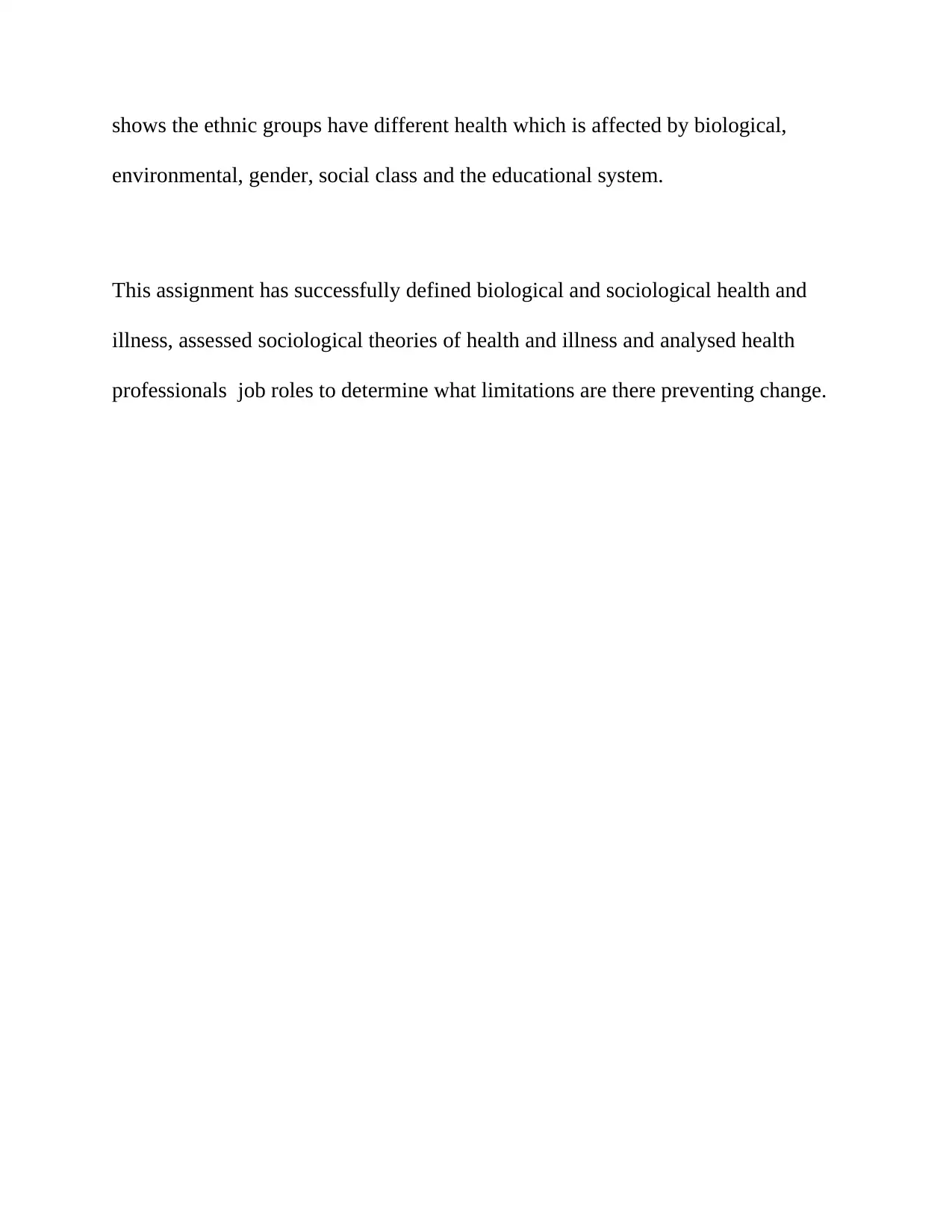
shows the ethnic groups have different health which is affected by biological,
environmental, gender, social class and the educational system.
This assignment has successfully defined biological and sociological health and
illness, assessed sociological theories of health and illness and analysed health
professionals job roles to determine what limitations are there preventing change.
environmental, gender, social class and the educational system.
This assignment has successfully defined biological and sociological health and
illness, assessed sociological theories of health and illness and analysed health
professionals job roles to determine what limitations are there preventing change.
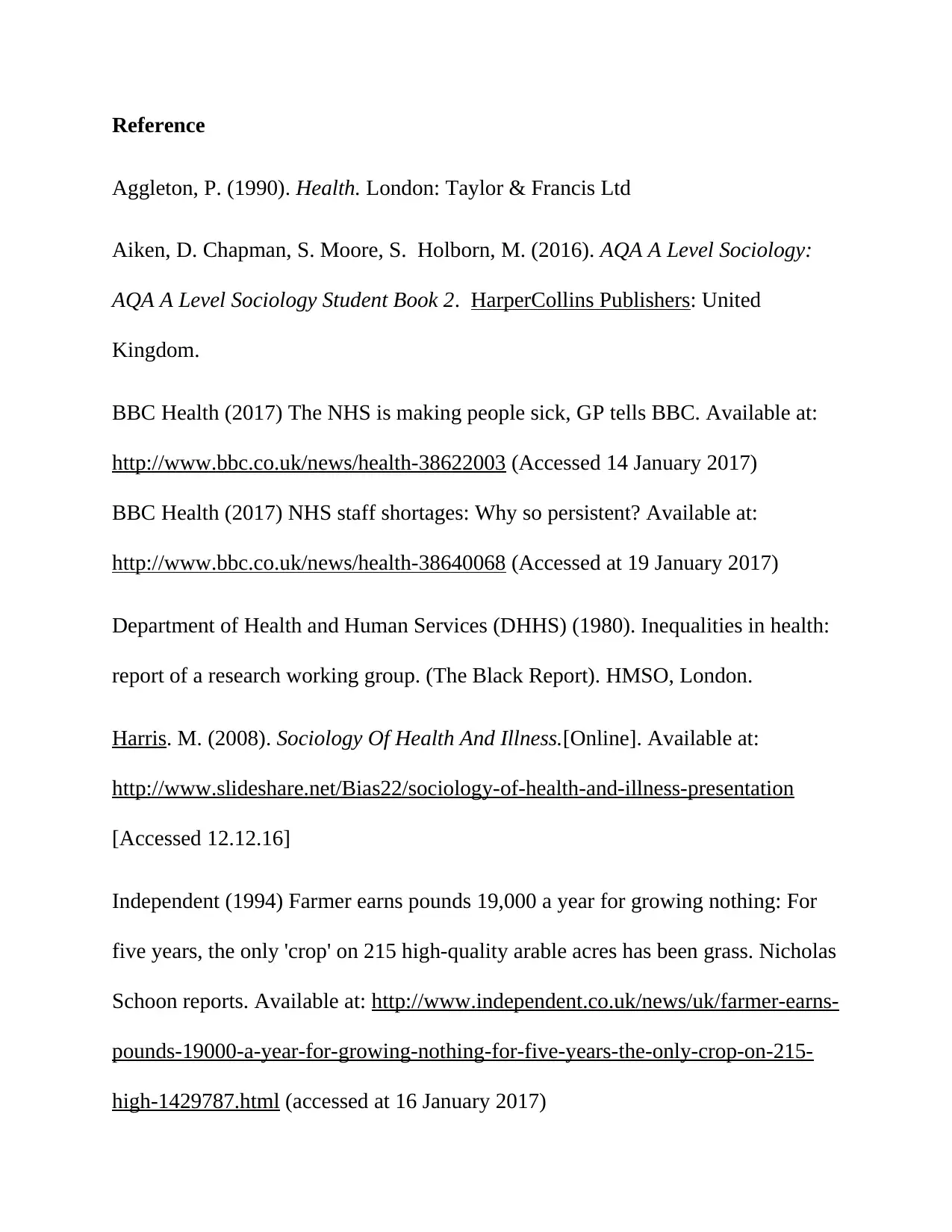
Reference
Aggleton, P. (1990). Health. London: Taylor & Francis Ltd
Aiken, D. Chapman, S. Moore, S. Holborn, M. (2016). AQA A Level Sociology:
AQA A Level Sociology Student Book 2. HarperCollins Publishers: United
Kingdom.
BBC Health (2017) The NHS is making people sick, GP tells BBC. Available at:
http://www.bbc.co.uk/news/health-38622003 (Accessed 14 January 2017)
BBC Health (2017) NHS staff shortages: Why so persistent? Available at:
http://www.bbc.co.uk/news/health-38640068 (Accessed at 19 January 2017)
Department of Health and Human Services (DHHS) (1980). Inequalities in health:
report of a research working group. (The Black Report). HMSO, London.
Harris. M. (2008). Sociology Of Health And Illness.[Online]. Available at:
http://www.slideshare.net/Bias22/sociology-of-health-and-illness-presentation
[Accessed 12.12.16]
Independent (1994) Farmer earns pounds 19,000 a year for growing nothing: For
five years, the only 'crop' on 215 high-quality arable acres has been grass. Nicholas
Schoon reports. Available at: http://www.independent.co.uk/news/uk/farmer-earns-
pounds-19000-a-year-for-growing-nothing-for-five-years-the-only-crop-on-215-
high-1429787.html (accessed at 16 January 2017)
Aggleton, P. (1990). Health. London: Taylor & Francis Ltd
Aiken, D. Chapman, S. Moore, S. Holborn, M. (2016). AQA A Level Sociology:
AQA A Level Sociology Student Book 2. HarperCollins Publishers: United
Kingdom.
BBC Health (2017) The NHS is making people sick, GP tells BBC. Available at:
http://www.bbc.co.uk/news/health-38622003 (Accessed 14 January 2017)
BBC Health (2017) NHS staff shortages: Why so persistent? Available at:
http://www.bbc.co.uk/news/health-38640068 (Accessed at 19 January 2017)
Department of Health and Human Services (DHHS) (1980). Inequalities in health:
report of a research working group. (The Black Report). HMSO, London.
Harris. M. (2008). Sociology Of Health And Illness.[Online]. Available at:
http://www.slideshare.net/Bias22/sociology-of-health-and-illness-presentation
[Accessed 12.12.16]
Independent (1994) Farmer earns pounds 19,000 a year for growing nothing: For
five years, the only 'crop' on 215 high-quality arable acres has been grass. Nicholas
Schoon reports. Available at: http://www.independent.co.uk/news/uk/farmer-earns-
pounds-19000-a-year-for-growing-nothing-for-five-years-the-only-crop-on-215-
high-1429787.html (accessed at 16 January 2017)
⊘ This is a preview!⊘
Do you want full access?
Subscribe today to unlock all pages.

Trusted by 1+ million students worldwide
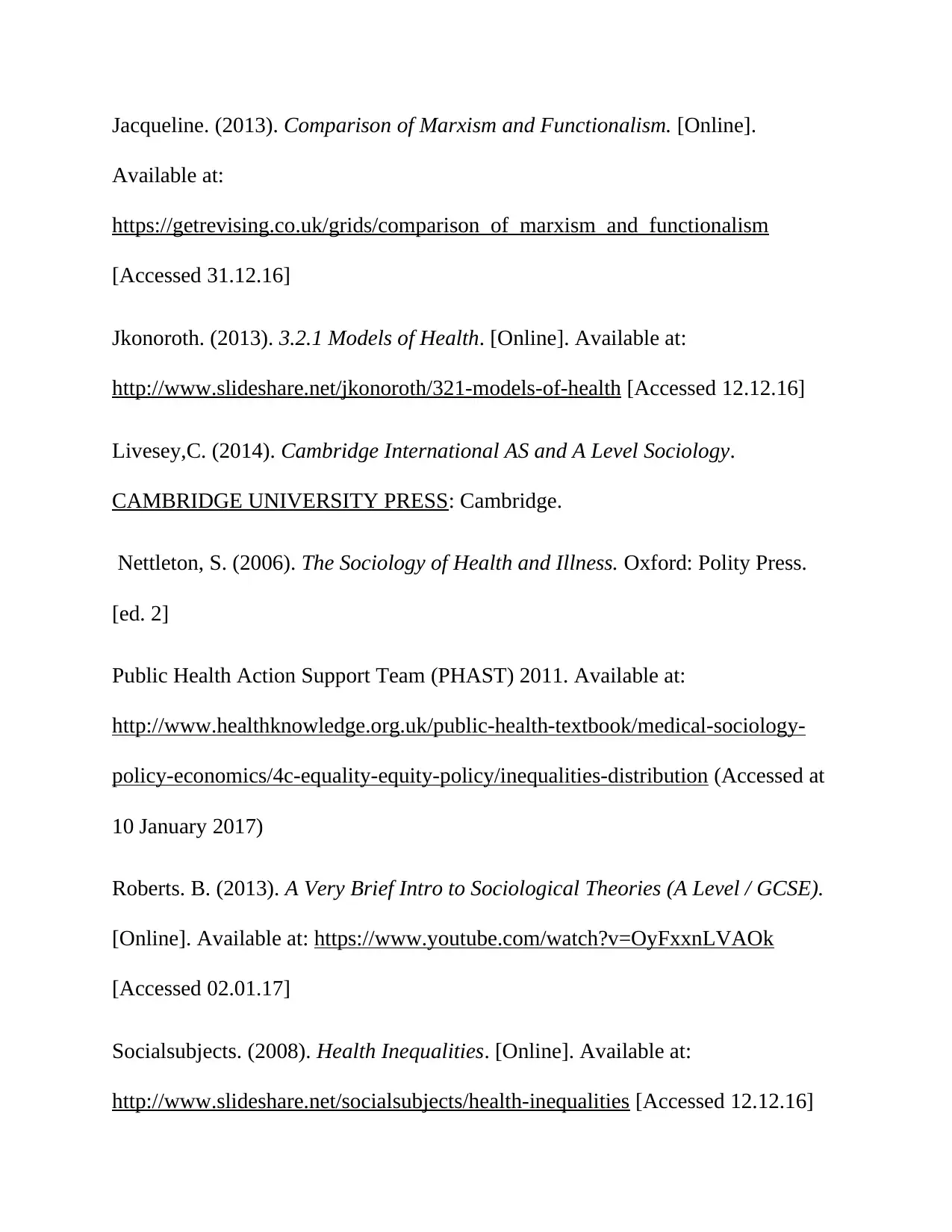
Jacqueline. (2013). Comparison of Marxism and Functionalism. [Online].
Available at:
https://getrevising.co.uk/grids/comparison_of_marxism_and_functionalism
[Accessed 31.12.16]
Jkonoroth. (2013). 3.2.1 Models of Health. [Online]. Available at:
http://www.slideshare.net/jkonoroth/321-models-of-health [Accessed 12.12.16]
Livesey,C. (2014). Cambridge International AS and A Level Sociology.
CAMBRIDGE UNIVERSITY PRESS: Cambridge.
Nettleton, S. (2006). The Sociology of Health and Illness. Oxford: Polity Press.
[ed. 2]
Public Health Action Support Team (PHAST) 2011. Available at:
http://www.healthknowledge.org.uk/public-health-textbook/medical-sociology-
policy-economics/4c-equality-equity-policy/inequalities-distribution (Accessed at
10 January 2017)
Roberts. B. (2013). A Very Brief Intro to Sociological Theories (A Level / GCSE).
[Online]. Available at: https://www.youtube.com/watch?v=OyFxxnLVAOk
[Accessed 02.01.17]
Socialsubjects. (2008). Health Inequalities. [Online]. Available at:
http://www.slideshare.net/socialsubjects/health-inequalities [Accessed 12.12.16]
Available at:
https://getrevising.co.uk/grids/comparison_of_marxism_and_functionalism
[Accessed 31.12.16]
Jkonoroth. (2013). 3.2.1 Models of Health. [Online]. Available at:
http://www.slideshare.net/jkonoroth/321-models-of-health [Accessed 12.12.16]
Livesey,C. (2014). Cambridge International AS and A Level Sociology.
CAMBRIDGE UNIVERSITY PRESS: Cambridge.
Nettleton, S. (2006). The Sociology of Health and Illness. Oxford: Polity Press.
[ed. 2]
Public Health Action Support Team (PHAST) 2011. Available at:
http://www.healthknowledge.org.uk/public-health-textbook/medical-sociology-
policy-economics/4c-equality-equity-policy/inequalities-distribution (Accessed at
10 January 2017)
Roberts. B. (2013). A Very Brief Intro to Sociological Theories (A Level / GCSE).
[Online]. Available at: https://www.youtube.com/watch?v=OyFxxnLVAOk
[Accessed 02.01.17]
Socialsubjects. (2008). Health Inequalities. [Online]. Available at:
http://www.slideshare.net/socialsubjects/health-inequalities [Accessed 12.12.16]
Paraphrase This Document
Need a fresh take? Get an instant paraphrase of this document with our AI Paraphraser
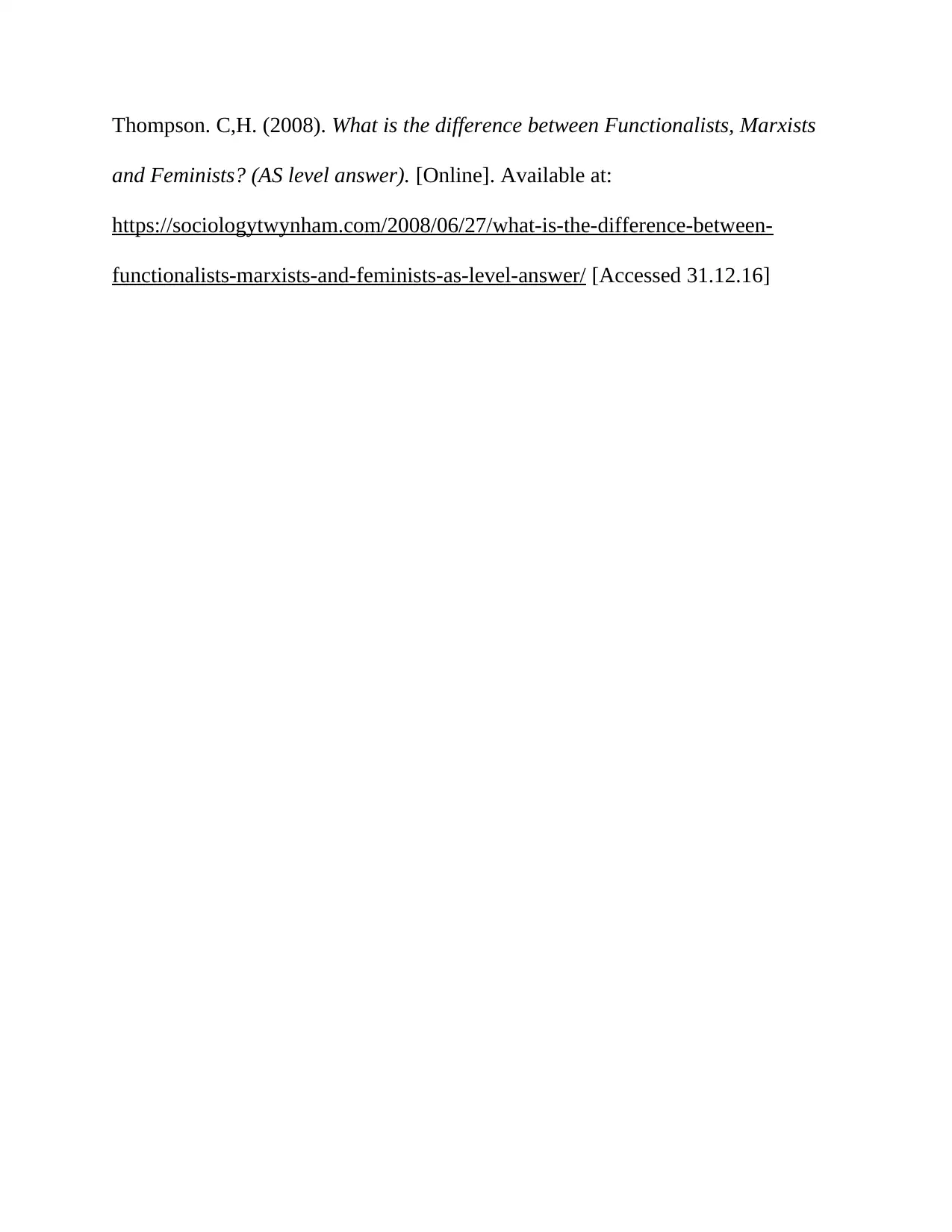
Thompson. C,H. (2008). What is the difference between Functionalists, Marxists
and Feminists? (AS level answer). [Online]. Available at:
https://sociologytwynham.com/2008/06/27/what-is-the-difference-between-
functionalists-marxists-and-feminists-as-level-answer/ [Accessed 31.12.16]
and Feminists? (AS level answer). [Online]. Available at:
https://sociologytwynham.com/2008/06/27/what-is-the-difference-between-
functionalists-marxists-and-feminists-as-level-answer/ [Accessed 31.12.16]
1 out of 11
Related Documents
Your All-in-One AI-Powered Toolkit for Academic Success.
+13062052269
info@desklib.com
Available 24*7 on WhatsApp / Email
![[object Object]](/_next/static/media/star-bottom.7253800d.svg)
Unlock your academic potential
Copyright © 2020–2026 A2Z Services. All Rights Reserved. Developed and managed by ZUCOL.





